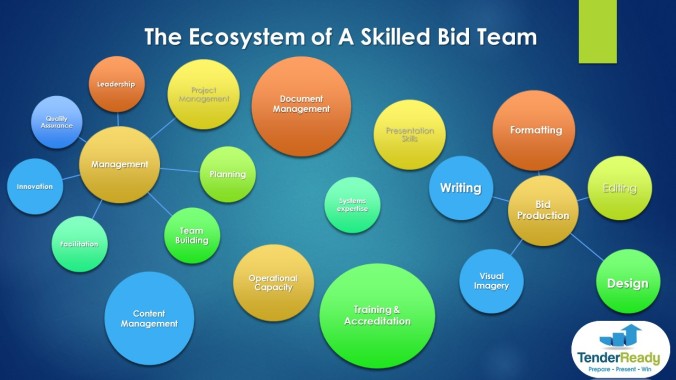 Public sector procurement has evolved to facilitate SME participation. In EU legislation this has been driven and backed by the UK government in support its strong SME culture, however this trend is evident across the globe given the close links between EU procurement legislation and the *World Trade Organisation Government Procurement Agreement. (This is also why UK procurement legislation will largely remain in line with EU procurement regardless of the outcome of Brexit negotiations; the countries that the UK wants to trade with are by and large parties to the WTO GPA) Obvious initiatives that allow SMEs to participate in higher value procurement include turnover caps (when buyers specify a certain turnover level as a requirement in a tender; this is now limited to twice the contract value) and the breaking up of large contracts into smaller lots (Tiered supply chain where Tier 1 suppliers act as a main contractor and take on the role of the buyer). In this piece I want to talk about a particular concept, lifecycle costing, which whilst not necessarily aimed at SMEs, with some consideration can certainly give an SME the edge when bidding against larger competitors.
Public sector procurement has evolved to facilitate SME participation. In EU legislation this has been driven and backed by the UK government in support its strong SME culture, however this trend is evident across the globe given the close links between EU procurement legislation and the *World Trade Organisation Government Procurement Agreement. (This is also why UK procurement legislation will largely remain in line with EU procurement regardless of the outcome of Brexit negotiations; the countries that the UK wants to trade with are by and large parties to the WTO GPA) Obvious initiatives that allow SMEs to participate in higher value procurement include turnover caps (when buyers specify a certain turnover level as a requirement in a tender; this is now limited to twice the contract value) and the breaking up of large contracts into smaller lots (Tiered supply chain where Tier 1 suppliers act as a main contractor and take on the role of the buyer). In this piece I want to talk about a particular concept, lifecycle costing, which whilst not necessarily aimed at SMEs, with some consideration can certainly give an SME the edge when bidding against larger competitors.
Lifecycle Costing
At its origin a management accounting measure, lifecycle costing is an evaluation tool that has been used in private sector bidding for a number of years now. Rather than looking at the upfront costs of a product or service, it takes into consideration the cost over the whole life of the product, including maintenance, upgrades and end of life/use disposal. Regulation 68 of the Public Sector Contracts Regulation 2015 now allows Lifecycle costing to be used as a measure by public sector buyers when cost is an evaluation criterion, however the EU Directive has broadened the definition of lifecycle costing to include environmental and socioeconomic factors:
“…the process whereby organisations meet their needs for goods, services, works and utilities in a way that achieves ‘value for money on a whole life basis’ in terms of generating benefits not only to the organisation but also to society and the economy, whilst limiting damage to the environment.” Defra UK Sustainable Procurement Task Force.
Why the inclusion and expansion of lifecycle costing? A simple reason, when public money is being spent, authorities want to ensure that society as a whole is benefitting, not just public sector organisations and the industries they engage. So, for example, governments may want to ensure that taxpayers money is being spent to support the growth of green business, ensuring a healthier environment for its citizens, both present and future, or may want to focus on areas such as skills development in local economies or providing work life balance for families.
How can SMEs benefit from this when tendering for contracts?
The benefits that SMEs can bring to a contract actually mirror the aims of lifecycle costing as it is defined in public procurement, so it is important that when planning a bid response companies carefully consider the concept of lifecycle costing and what aspects of their offering they should highlight throughout the response. Below are some of the areas that we ask our clients to consider and talk about in their bid responses. It is worth noting that even if lifecycle costing is not stated as a method of evaluation in a requirements document, SMEs can still gain competitive advantage by considering the following:
- Flexibility, delivery and expertise.
SMEs can offer a bespoke service and a level of flexibility that main contractors cannot. They are often specialists in their field, offering best in class point solutions to particular problems that can be rolled out, and scaled up, with a level of speed and flexibility that is not always possible in large enterprises. These factors can have a positive impact on the overall lifecycle and cost of the project. If you are an SME planning to bid for public sector contracts it is worth carrying out a review of processes and delivery methodology to understand where these exist and identify any further areas where these can be improved.
- Innovation
SMEs are often very customer aligned, and attuned to the current and future needs of their clients. There is less bureaucracy in SMEs than in larger enterprise, and because of this more potential for collaborative working. Therefore, when employees at the frontline feed-back ideas to management, these can be taken on-board, assessed and acted upon much more quickly than in larger companies. An innovation audit, looking at areas such as leadership and management style, the identification of new opportunities, levels of bureaucracy, communication channels and appetite for change, is a worthwhile exercise to understand the areas where innovation is most apparent, and identify the areas where it can be further encouraged as this can be present a major competitive advantage for SMEs.
- Socio- economic factors.
Smaller businesses are usually more closely linked to the local economy, which directly benefits from any increase in major contract wins via the creation of new jobs, upskilling and retraining staff; this will in turn create demand for other local businesses, putting money back into the local economy, triggering the host of social benefits that come with a thriving local economy. Some of this is also true of larger business, however it is more likely that a local SME winning a major contract will have a direct and immediate impact on local employment. Take some time to think about the positive impact your business has on the local economy, include employees in this conversation and make sure you plan this into your bid submission.
- Legacy
Legacy is now an important aspect of public procurement and also large scale public realm projects, and looks at the ongoing impact a project can have, once the service has been completed or the products have been disposed of. Most of us will be familiar with ‘Legacy’ on a larger scale with the London 2012 Olympics, but smaller contracts can leave a positive legacy also, so it is important to think of this when planning a bid response. For example, if employees require further training or upskilling to deliver a contract, what could their future career path be, might they be inspired to start their own business at some point in the future? Will you take on apprentices and give them their first start on the career ladder? Will the increase in business allow you to sponsor a local cause, perhaps a children’s football team allowing young people to be active and learn valuable skills such as teamwork? All of these seemingly small benefits all add up to a positive local legacy.
- Environmental
There are a number of ways in which SMEs are environmentally conscious, some of these by nature some by design. Examples of the former include having a lower carbon footprint due to sourcing from other local companies and employing local people and reducing wastage and also waste to reduce overall costs. With regards to the latter, as mentioned previously SMEs are closer to their customer base, a customer base that has become increasingly environmentally aware, increasingly more connected with the advent of social media, and increasingly more willing to vote with their feet alongside their social peers. Whilst Costa, Starbucks et al will feel some impact of the recent revelations on the recycling of coffee cups, it will be but a drop in the ocean, however the unearthing of such eco-destructive practices could have a major impact on an SME. The point here is that SMEs have become greener, it doesn’t matter whether it is by choice or as a survival tool, it is all valid and should all be included in any bid submission.
Here at Tender Ready we are long time advocates of SME growth strategies that involve bidding for public sector business, as we have seen first-hand the positive impact this has had on both our own, and our client businesses. The traditional procurement landscape that excluded SMEs has changed drastically, and in our opinion is weighted towards SME success. There has never been a better time to plan a bid management strategy. If you would like to have a (free and no obligation) chat about what we have discussed here and how we help our clients frame these areas in their bid responses, please don’t hesitate to contact us. If you like what you have read today, please follow us on linkedin, we have some interesting events and content planned for the autumn months.
Until then, keep on tendering!
The team at Tender Ready
 Rio 2016 is upon us! It has been a somewhat subdued build up, given that the last games were right on our doorstep, and we were all thus fully participant in and aware of the fanfare, the advertising campaigns, the supermarket offers and all of the build-up activities leading us into the games. But the day has arrived, and from Saturday onward I will very much look forward to watching world class athletes perform in the stunning backdrop of Rio de Janeiro, and I’ll be very envious of my colleagues and peers who are out there.
Rio 2016 is upon us! It has been a somewhat subdued build up, given that the last games were right on our doorstep, and we were all thus fully participant in and aware of the fanfare, the advertising campaigns, the supermarket offers and all of the build-up activities leading us into the games. But the day has arrived, and from Saturday onward I will very much look forward to watching world class athletes perform in the stunning backdrop of Rio de Janeiro, and I’ll be very envious of my colleagues and peers who are out there.
 Like every other business, and indeed voting age person in the UK, we’ve been following, reading about, discussing, debating, arguing about even shouting at the TV about Brexit, both in the leadup to and now after, the referendum. We decided not to blog about it as a company, for a couple of reasons, the first and most important being that we didn’t think much would change in the procurement landscape, in the short term at least, but probably not in the long term either. So we didn’t have anything funny, outrageous, strange or startling (i.e. new) to add to the noise and general melee.
Like every other business, and indeed voting age person in the UK, we’ve been following, reading about, discussing, debating, arguing about even shouting at the TV about Brexit, both in the leadup to and now after, the referendum. We decided not to blog about it as a company, for a couple of reasons, the first and most important being that we didn’t think much would change in the procurement landscape, in the short term at least, but probably not in the long term either. So we didn’t have anything funny, outrageous, strange or startling (i.e. new) to add to the noise and general melee.